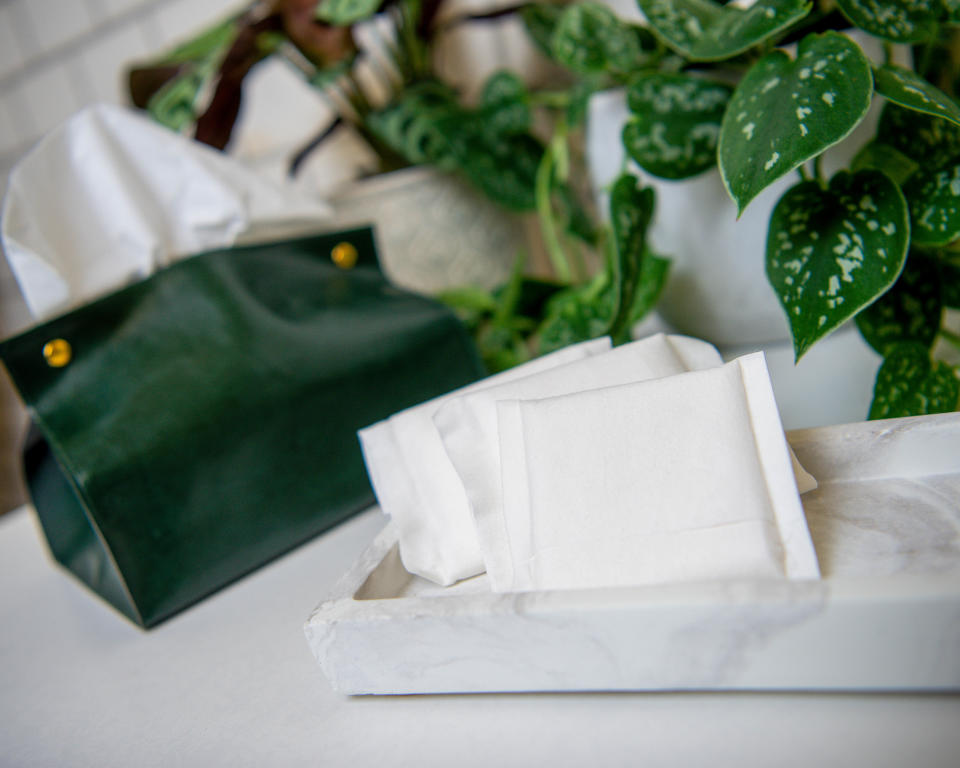Flushable sanitary pads are here to help periods become more sustainable
Watch: UK based personal hygiene company invent the world’s only flushable and biodegradable sanitary pad
For years we’ve been warned not to flush sanitary products down the toilet.
Now, however, one sustainable brand has created a plastic-free period product that they actually want you to flush away.
Approximately 700,000 panty liners, 2.5 million tampons and 1.4 million sanitary towels are flushed down the toilet in the UK every single day, according to figures published in the Journal of the Institution of Environmental Sciences.
This equates to around 200,000 tonnes of sanitary waste produced every year in the UK, with 30% ending up in our waterways and 56% in landfills.
In fact sanitary products are the fifth most common item found on Europe’s beaches, more widespread than single-use coffee cups, cutlery or straws.
Read more: Pantone releases new colour to tackle the stigma surrounding menstruation
So wouldn’t it be amazing to have a period product that didn’t contribute to the plastic problem?
Enter Planera, a new brand producing sanitary pads that are completely flushable.
You can simply throw the pads into the toilet after use and they’ll break down like regular toilet paper.

The idea for the products came about after the founders became frustrated that companies weren’t doing more to help facilitate eco-friendly periods.
“The guilt and responsibility of sustainability was being forced onto us as the consumer,” the company’s co-founder, Dr Olivia Ahn, told Yahoo UK.
“It was seen as our job to split apart packaging, wash out bottles, find and decipher the confusing labels to dispose of properly in the right bin.
“Why are companies making it so difficult for us to live sustainably? I felt it was the companies’ responsibility to make it easy for us to sustainably use and dispose of a product. After all, they were the one making the products.”
Read more: Superdrug launches range of sanitary products for 'people who menstruate'
So along with engineer Aaron Koshy, Ahn set about developing flushable and biodegradable sanitary pads.
“Over half of the world needs access to sanitary products,” Dr Ahn continues. “We deserve to have a high-performing, convenient and sustainable product. Currently, there is no sustainable way of disposing of sanitary products.
“With the world, quite literally on fire, we need a sustainable solution for disposable sanitary products - a flushable and biodegradable pad provides that, using existing sewage infrastructure.”
A post shared by PLANERA (@planeracare) on
Planera’s pads have been successfully and independently tested in accordance with the water industry’s specification for flushability testing.
The pads have been designed to be as effective as traditional sanitary towels.
Comprising of three layers, the top-sheet is made with biodegradable plant fibres (cushioned to be gentler on the skin). A wood pulp core then removes blood from the top sheet and a biodegradable powder locks it in as a gel.
Planera is currently running a trial period for customers to try out the flushable pads and give feedback.
Read more: Bodyform's advert is the boundary-breaking period campaign women have been waiting for
While flushable pads are a huge step forward in the drive for more sustainable periods, there are also other period products that are more eco-friendly than traditional sanitary towels and tampons.
We’ve all heard about reusable coffee cups, but did you know you can get reusable tampon applicators?
British organic tampon company DAME has a reusable applicator. The idea is you use, rinse and reuse the applicator, instead of throwing away countless plastic ones every month.
If tampons aren’t your bag, you can also get reusable pads which you pop in the washing machine after using them.
And of course you could always give a menstrual cups or menstrual pants a whirl.
The good news is these can also help you save money, with one menstrual cup predicted to last up to 10 years and period pants for five years. So while the upfront spend is more, ultimately you’ll save money in the long run, with some estimating you could save £128 a year by switching to a menstrual cup.
But trying to be more environmentally friendly when it comes to your period shouldn’t come at the expense of risking your health, so there’s one so-called sustainable period trick we probably should avoid.
Earlier this year doctors warned women against crocheted and knitted tampons after noticing an upward trend in the reusable menstrual products being sold online.
The problem is that DIY or handmade tampons, don’t have to pass rigorous safety regulations like those of their shop-bought counterparts.




